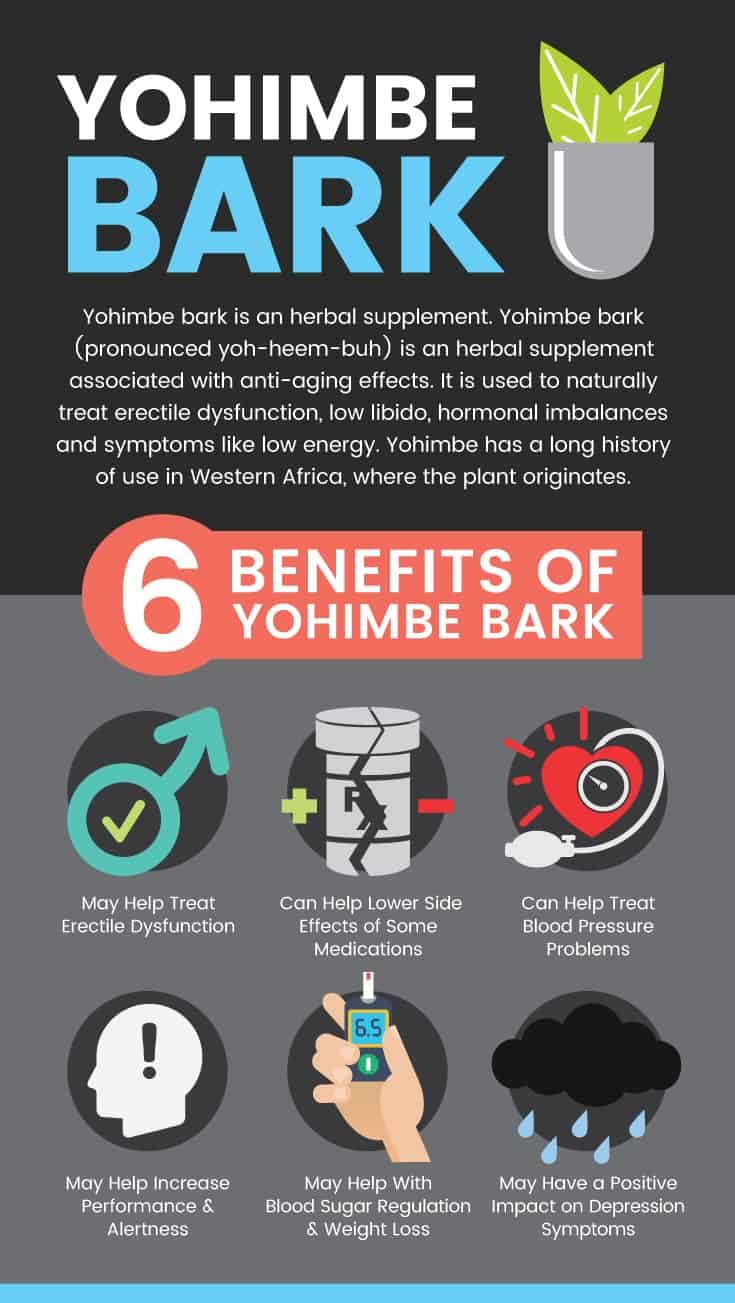
Yohimbe (pronounced yoh-heem-buh) is an herbal supplement associated with anti-aging effects. It is used to naturally treat erectile dysfunction, low libido, hormonal imbalances and symptoms like low energy. Yohimbe has a long history of use in Western Africa, where the plant originates. It’s still grown there today, especially for its apparent aphrodisiac abilities.
According to a report published in Pharmacognosy Review, yohimbe is the only herb listed for sexual function the Physician’s Desk Reference. Yohimbe has earned the nickname “herbal viagra.” It has been used in certain medications, especially those indicated to treat sexual dysfunction, for over 75 years.
Yohimbe also may act as a mild hallucinogenic, causing neurological reactions that can be wide-ranging. According to the Pavia Poison Control Center in Italy, “Yohimbine is currently approved in the U.S. for erectile dysfunction but has undergone resurgence in street use as an aphrodisiac and mild hallucinogen.”
So do yohimbe supplements actually work to help treat sexual problems like impotence, or other conditions? Study results have been somewhat mixed. It can be especially helpful when combined with other substances that promote better flow and higher energy levels, such as L-arginine.
What Is Yohimbe?
Yohimbe is an herbal supplement. Its species name is Pausinystalia yohimbe. Yohimbe comes from the bark of the evergreen Corynanthe yohimbe tree, which is in the plant family called Rubiaceae.
Ad

Yohimbe is often sold in capsule or tablet form and goes by many names depending on how it’s sold. These include Yohimbehe, Yocon, Yohimex, Johime, Aphrodien, Aphrodyne and Corynine. It’s marketed as yohimbe bark extract or yohimbine, which is the active ingredient in yohimbe bark.
Yohimbine is also used to make certain medications. Civilizations in Western Africa have used it for centuries. Today it’s studied for its ability to help treat conditions, including erectile dysfunction/impotence, diabetes, depression, hypotension and overuse of certain medications.
One of the main actions of yohimbe bark is alpha-2 antagonism (this is why it’s also sometimes called an “alpha-2 blocker”). This means that it can impact sympathetic nervous system activity and increase the release of adrenaline (or noradrenaline). This is because it blocks alpha-2 receptors in the brain stem.
Other types of alpha-2 agonists medications work in a similar way. They affect the central nervous system by altering release of certain neurotransmitters and dilating blood vessels. This increases alertness, circulation and other physiological processes.
Due to its ability to inhibit actions of the sympathetic nervous system, yohimbe can help to bring blood pressure levels back to balance. This is is why it’s used to sometimes increase blood flow, such as to tissues of the reproductive organs. Or, also why it’s used to treat hypotension (abnormally low blood pressure). It may also be helpful for stimulating nerves and treating fatigue or symptoms of depression.
Nutrition Facts
The primary active ingredient found in yohimbe bark is the alkaloid yohimbine. This may also be called alpha-yohimbine or allo-yohimbine.
In the U.S., certain prescription drugs containing yohimbine have been approved since the 1980s. They are labeled Yohimbine hydrochloride. Yohimbine medications are prescribed most commonly to treat sexual dysfunction in both men and women caused by a number of factors like aging, hormonal imbalances or side effects of medications.
Some studies suggest that alpha 2-antagonists may help improve patients’ response to antidepressant medications. Yohimbe has a chemical structure that is similar to several medications, and even recreational drugs, that are used to manage conditions like like mood-related disorders such as depression or schizophrenia, low libido, dizziness due to low blood pressure, and others.
While yohimbine doesn’t actually have psychedelic effects, according to research findings, it impacts neurotransmitters including dopamine, adrenaline and serotonin. It also seems to help some people suffering from symptoms due to mental illness.

Benefits
1. May Help Treat Erectile Dysfunction
Yohimbe is commonly taken to increase sexual excitement and to reduce sexual problems such as symptoms of erectile dysfunction (ED), also called impotence. Research shows that yohimbe may be capable of increasing blood flow to the penis or vagina. It also increases nerve impulses that play a role in orgasm.
Due to how yohimbine affects blood vessels, it can cause relaxation of the penile tissue and engorgement of blood. This helps a man to maintain an erection. These effects are beneficial for both sexes when it comes to experiencing sexual satisfaction.
There have been only a few well-controlled studies to test the effects of herbal yohimbe (as opposed to medications) on humans. There’s some evidence that yohimbine has potential to enhance the nitric oxide pathway, helping to bring blood flow to the corpus cavernosum tissue of the penis. It may also stimulate the pelvic nerve ganglia and boost adrenaline supply to nerve endings. It seems to have the most effects overall when combined with other treatments or herbal remedies.
One study that evaluated the effects of yohimbe on erectile dysfunction found that those taking the herbal remedy experienced slight benefits compared to a control group that was not taking the supplement.
Overall, studies have been inconclusive about the aphrodisiac benefits of taking yohimbine supplements. However, most have found it works better than placebos.
According to a report published in the Iranian Journal of Psychiatry, an analysis of seven trials concluded that between 34–75 percent of men involved in studies experienced favorable results when taking between 5–10 milligrams.
Ad

2. Can Help Lower Side Effects of Some Medications
Some people experience symptoms of sexual dysfunction, including erectile dysfunction or loss of interest in sex, when taking medications for depression or anxiety disorders called selective-serotonin reuptake inhibitors (SSRIs). Yohimbine-containing medications are not intended to treat these symptoms.
Some doctors use yohimbine to offset negative effects of treating mental illnesses. For example, one study investigated yohimbine as a therapeutic augmentation strategy for social anxiety disorder and beneficial effects were seen. It can also decrease lethargy or low pressure since it acts as a mild stimulant. Additionally it may help to prevent complications in diabetic patients, including diabetic neuropathy.
READ RELATED: Honeydew: 10 Benefits + How to Choose a Ripe Melon
However, another trial that gave 20 milligrams of yohimbine to patients suffering from a panic disorder showed that it induced more pronounced increases in anxiety and panicky ratings, maximum heart rate and high heart rate variability, and decreases in skin temperature compared with controls.
3. Can Help Treat Low Blood Pressure
As an alpha-2 antagonist, yohimbine promotes sympathetic activity. According to a number of studies, yohimbe can increase blood pressure. This is why it’s useful for things like erectile dysfunction or diabetic nerve problems. Yohimbine is sometimes used to treat low blood pressure and symptoms like dizziness when standing up. It works by dilating blood vessels and acting on the sympathetic nervous system.
However, it’s important to point out that increased blood pressure can also be a problem for some people, especially those with existing cardiovascular problems, people taking blood pressure medications, or those who already have high blood pressure.
One study showed that among 25 unmedicated hypertensive subjects, 21 grams of yohimbine increased blood pressure by an average of 5 mm Hg and plasma norepinephrine levels increased by 66 percent. Therefore, study authors said that yohimbine should be administered with caution to patients with high blood pressure, especially in individuals with “increased basal sympathetic outflow” or those being treated with tricyclic antidepressants or other drugs that interfere with neuronal uptake or metabolism of norepinephrine.
4. May Help Increase Performance & Alertness
Athletes or dieters sometimes use products containing yohimbe to help promote easier weight loss, especially from body fat, and to increase energy expenditure. Some have speculated that it may help increase muscle mass and endurance while cutting fat. But there’s not much evidence from studies that this is necessarily true.
Yohimbe does seem to have potential to increase energy expenditure by acting as a stimulant, increasing adrenaline levels in the body and potentially preventing fatigue during or following exercise.
A 2022 study looked at how one 2.5 milligram dose of yohimbine impacted repeated anaerobic sprint ability among a group of female participants. Heart rate and rate of perceived exertion (RPE) were measured following each WAnT. Mean power, total work and heart rate were significantly higher with yohimbe supplementation versus placebo. Fatigue index and post-exercise lactate were significantly lower compared to placebo. While more research is needed, it appears that yohimbe may improve fast-twitch muscle performance, such as with sprints and many sports.
Another study that evaluated the effects of yohimbine supplementation on body composition (muscle mass, body mass, etc.) and exercise performance in professional soccer players found that body fat percentage/fat mass significantly decreased in the yohimbine group compared to the placebo group. However, supplementation with yohimbine did not significantly alter overall body mass, muscle mass, or performance indicators.
Other studies, however, have found that people do tend to experience increases in energy and alertness when taking yohimbe, sometimes even so much that it causes symptoms of anxiety or restlessness (much like caffeine does).
5. May Help With Blood Sugar Regulation and Weight Loss
Yohimbine may have certain fat-burning abilities and work even better while someone is fasting. Given that yohimbine can act as a mild stimulant, researchers have looked at whether it can help increase energy levels in those looking to become more active, or whether it has positive effects on reducing appetite, regulating blood sugar levels, or promoting growth of muscle mass that can then help with weight loss.
Although not every study has shown that yohimbe can have slimming effects, certain other studies have found positive results. One study found that yohimbine significantly increased mean weight loss in overweight female patients following a low-energy diet.
Possible mechanisms of action include: boosting lipolysis (the breakdown of fats and other lipids by releasing fatty acids into the blood) both during and following exercise, regulating insulin secretion, and reducing appetite.
6. May Have a Positive Impact on Depression Symptoms
Studies have found that as an alpha 2-antagonist, yohimbine has properties that can help increase dopamine levels in the brain when used alone or in combination with other anti-depressant treatments, such as the medication called fluoxetine.
Yohimbine also helps to increase levels of the coenzyme NAD (nicotinamide adenine dinucleotide). This affects metabolism, cognitive processes and detoxification of drugs in the body. NAD is not currently used to treat cognitive or mood-related disorders on its own, but has been shown in some studies to potentially have uses for preventing neurodegenerative diseases including Parkinson’s disease or Alzheimer’s.
However, on the other hand, studies have found that because it can increase anxiety in some patients, yohimbine may actually worsen mental illness in some patients, including those with Parkinson’s. For this reason, it’s important for anyone taking mood-altering medications, or who has a history of any cognitive or mood disorder, to work with a healthcare professional while taking or starting any new herbal treatments.
How to Use
Yohimbe is available in capsule/tablet form in health food stores or online. It’s rare to find the actual bark or extract form, although it may be possible. Dosage recommendations for yohimbe depend on its use. Dosages should ideally be adjusted based on body weight and sometimes sex.
There’s some concern that supplements labeled as yohimbe contain different amounts of the active ingredient than the amount that’s listed. The FDA strictly regulates prescriptions containing yohimbine but not supplements. It can be difficult to determine exactly how much active yohimbine is in supplements due to how different growing and distributing variables affect the concentration.
These variables can include: the exact type of yohimbe tree bark that is used, what part of the tree the bark is taken from, the maturity of the tree, how fresh the bark is, the processing techniques used to create supplements, and how the supplements are shipped/exported and stored.
Below are general recommendations for yohimbe dosages, according to the condition or symptom:
- For erectile dysfunction: adult men should take about 5.4 milligrams 1–3 times daily. Most studies have found positive results when taking about 10–20 milligrams total daily.
- For hypotension in adults: take about 12.5 milligrams daily
- Much higher doses have been used in certain studies, sometimes up to 100 milligrams daily. However, this is considered a very high dose that is potentially dangerous and likely to cause some side effects. Overall, it’s best to start with small doses while monitoring your reaction. Speak to a doctor or herbal practitioner before increasing your dosage to high levels.
- If using yohimbe in dry plant tincture form (DPT) look for a concentration of about 35 percent yohimbe (65 percent alcohol) and use about 10–30 drops one to three times daily.
- It’s best to take yohimbe when fasting, first thing in the morning, or between meals. Because it has stimulating effects, don’t combine yohimbe with other stimulants like caffeine or weight loss pills. These may cause reactions like faster heart rate, anxiety, high blood pressure or even cardiovascular complications. If you are planning on having caffeine along wth yohimbe (such as coffee or tea in the morning), start with a half-dose in order to test your reaction.
Risks and Side Effects
People who do not have any contra-indications (see below) generally tolerate it well. Study results have been mixed about yohimbine’s potential side effects, but it seems that in moderate doses it usually won’t excessively raise the heart rate, cause very high blood pressure, or contribute to anxiety as long as it’s not combined with other stimulants.
However, taking yohimbe can sometimes cause side effects including: high blood pressure, headaches, anxiety, restlessness/nervousness, dizziness or shakiness. These side effects seem to affect people with a history of mental illness or mood-related problems most often. But it’s possible for them to develop in anybody.
Yohimbe can interact with several drugs and medications, so it’s not safe for everybody to use. Don’t take yohimbe if you’re currently taking any ACE inhibitor drug, beta blocker, SSRI drug, MAOI, stimulants or caffeine-containing drugs, or tricyclic antidepressant drugs.
Those who have any of the conditions listed below should not take herbal treatments like yohimbe without speaking with a doctor first. This is because it may affect things like blood pressure, heart health, kidney function and neurotransmitter functions:
- Renal disease
- Hypertension
- Angina
- Gastric ulcers
- Prostatitis
- Bipolar disorder, anxiety disorders, schizophrenia or suicidal tendencies
For children, or women who are pregnant or breast-feeding, it’s not safe to take yohimbe. Little research has been done to evaluate its effects on these populations.
Final Thoughts
- Yohimbe is an herbal supplement. Its species name is Pausinystalia yohimbe. It’s also used to make certain medications.
- Yohimbine is the active ingredient in yohimbe. Its benefits include treating erectile dysfunction in men and impotence in women, increasing exercise performance, potentially aiding in fat loss, and altering one’s mood.
- It’s not safe to use in combination with other stimulants (such as caffeine) or when taking medications for heart disease, liver or kidney dysfunction, or depression and/or anxiety.
!function(f,b,e,v,n,t,s)
{if(f.fbq)return;n=f.fbq=function(){n.callMethod?
n.callMethod.apply(n,arguments):n.queue.push(arguments)};
if(!f._fbq)f._fbq=n;n.push=n;n.loaded=!0;n.version=’2.0′;
n.queue=[];t=b.createElement(e);t.async=!0;
t.src=v;s=b.getElementsByTagName(e)[0];
s.parentNode.insertBefore(t,s)}(window, document,’script’,
‘
fbq(‘init’, ‘3475171552810057’);
fbq(‘track’, ‘PageView’);




